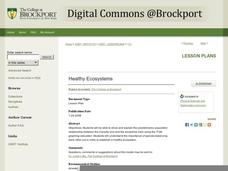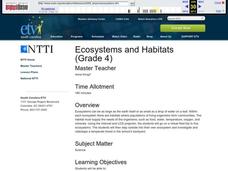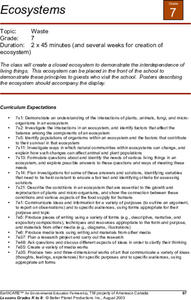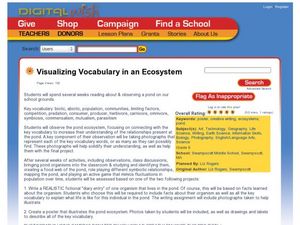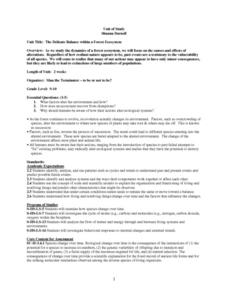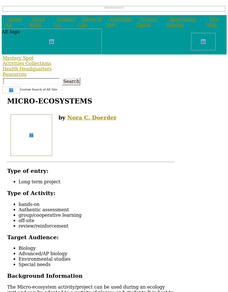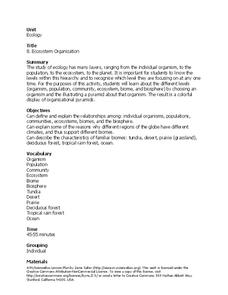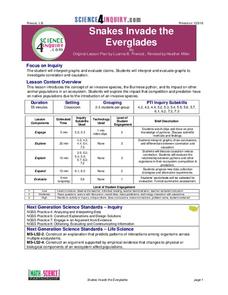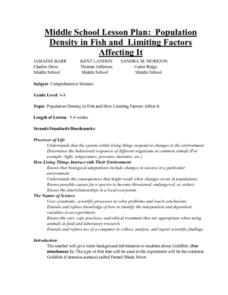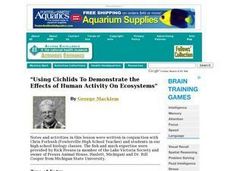College at Brockport
Healthy Ecosystems
Is there a connection between the snowshoe hare population and the lynx population? Young scientists will examine this question and graph actual data to determine the relationship between these two species, as well as researching another...
K12 Reader
Taiga Ecosystems
After reading a short article about taiga ecosystems, middle schoolers are asked to identify the characteristics of this chilly environment.
Curated OER
Ecology and the Biosphere
Ecology enthusiasts explore ecosystems with this worksheet. They define vocabulary terms and write out answers to questions about distribution and abundance of life. They complete a chart comparing abiotic and biotic factors of Earth's...
Curated OER
Balance and Flux Reveal How Organisms Are Connected in Ecosystems
Students read about cats in Borneo and discuss role predators play in controlling population size. They map the interdependencies among species. They read about flux in ecosystems and complete a worksheet.
Curated OER
Population Patterns
Students study patterns of population growth in an ecosystem and why populations must remain in balance. They interpret basic population graphs and suggest scenarios about different population growth patterns in an ecosystem.
Curated OER
Ecosystems II
Middle schoolers engage in a instructional activity that is about the concepts related to the careful balance of an ecosystem. They identify the beneficial and harmful relationships that can exist with diverse populations in an...
Curated OER
Ecosystems and Habitats
Fourth graders go on a virtual field trip to five ecosystems. They investigate and videotape a temperate forest in the school's backyard.
Curated OER
Ecosystems
Seventh graders create a closed ecosystem and place it where is it visible to others in the school. They label it with posters describing the interdependence of living things in the ecosystem. They discuss what might happen to the...
Curated OER
Visualizing Vocabulary in an Ecosystem
Sixth graders observe the pond ecosystem. In this ecosystem activity, 6th graders observe the organisms at the pond and create a poster that illustrates the pond.
Curated OER
The Delicate Balance within a Forest Ecosystem
Students examine the causes and effects of alterations in a forest ecosystem and evaluate how human actions may only seem to have minor consequences, but can lead to extinctions of large numbers of populations. Students produce an...
Curated OER
Micro-Ecosystems
Students create a sustainable, self-contained ecosystem in a ten-gallon aquarium.
Curated OER
Ecosystem Organization
Students examine the structure of ecosystems. In this ecology lesson, students listen to a lecture on relationships among organisms and biomes. Students use the information to create ecosystem organization pyramids.
Curated OER
Earth's Ecosystem: Seven Major Biomes
Students discuss the different types of ecosystems and the composition of biomes. Working in groups, they define various related terms and make posters of them. Then they explain their posters to the class.
Science 4 Inquiry
Snakes in the Everglades
The Burmese python is on the loose ... and he's hungry! Illustrate the differences between causative and correlative relationships through an inquiry lesson. Pupils examine several sources of information to determine if there is a...
Science Matters
That’s An Otter Story
Young scientists discover how sea otters' habitats have changed due to human impact. Through conversation, video observation, and story reading, scholars identify how human interactions change a specific ecosystem in both positive and...
Howard Hughes Medical Institute
Lesson 4: Gorongosa's Food Webs
Who eats who in the savannas of Africa? Explore trophic levels with part four of an eight-part series of lessons focused around Gorongosa National Park. After young explorers identify animals using trailcam images, they construct a food...
Shodor Education Foundation
Rabbits and Wolves
A change in a parameter can end in overpopulation. The resources gives pupils the opportunity to control the parameters of rabbits and wolves in a natural setting. Using the set parameters, the simulation runs and displays the population...
Curated OER
Population Density
Students use the scientific method to conduct an experiment and use varied methods to gather background information. They correctly use lab equipment and prepare tables and graphs that organize, conclude, and present their findings. ...
Curated OER
Some Similarities Between the Spread of an Infectious Disease and Population Growth
Students compare and contrast the spread of infectious diseases and population growth. In this biology lesson, students identify the exponential growth pattern of spreading diseases. They relate this to HIV infection and AIDS.
Curated OER
Ecosystem Interactions Web
Pupils pick an ecosystem (forest, desert, coral reef, open ocean, grassland, mountain, savanna, etc.) and design an interaction web for their chosen ecosystem. Each group shares their ecosystem's web of life with the class.
Curated OER
Making Connections, Linking Population and the Environment
Students find out that all habitats have a carrying capacity. They explore how the world's human population has grown markedly in the 20th century, and that humans impact environmental health. Students investigate that people can and...
Curated OER
Population Density In Fish
Students investigate how a population of fish multiplies in an ecosystem and the kinds of things that must be done to maintain a healthy population balance with other organisms that live there. They conduct an experiment to test the...
Curated OER
"Using Cichlids To Demonstrate the Effects of Human Activity On Ecosystems"
Students explore the freshwater ecosystem of Africa's Lake Victoria by creating a freshwater aquarium. They investigate factors affecting the aquarium's ecosystem and conduct lab activities.
Curated OER
Exploring Ecosystems
Fourth graders investigate ecosystems. In this ecosystem lesson, 4th graders explore producers, consumers, and decomposers and study the interdependence of each.


